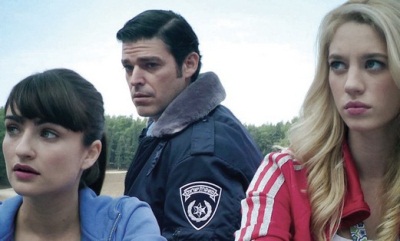There’s a lot of buzz around Rabies, it being the first slasher-horror flick to come out of Israel. Directed and written by Aharon Keshales and Navot Papushado, it combines all of the traditional tropes; bent cops, rich teens in crisp white shirts, and a psycho in the woods…
Rabies starts out in the woods, with Tali (Liat Harlev) trapped in subterranean metal cage. She and her brother-come-lover have run away from home, but seem to have stumbled into something so much worse. As Ofer (Henry David) goes to get help, we hear a squelch and a scream.
We also meet Menashe (Menashe Noy) in the woods for surveying with his girlfriend Rona (Efrat Boimold). They split up to work, and Menashe happens upon an unconscious Tali after shooting her kidnapper with a tranquiliser dart.
Ofer comes to, and lunges out of the woods onto the hood of a car driven by Mikey (Ran Danker) as he and his friends Pini (Ofer Shechter), Adi (Ania Bukstein) and Shir (Yael Grobglas) get lost on the way to a tennis match.
 Mikey and Pini go into the woods with Ofer, leaving Adi and Shir to call the cops. Yuval (Danny Geva) and Danny (Lior Ashkenazi) arrive on the scene, but Yuval has something else on his mind than serving and protecting, not least giving Shir a very thorough body search.
Mikey and Pini go into the woods with Ofer, leaving Adi and Shir to call the cops. Yuval (Danny Geva) and Danny (Lior Ashkenazi) arrive on the scene, but Yuval has something else on his mind than serving and protecting, not least giving Shir a very thorough body search.
The plot swings between the characters as, through a comedy of errors a la Tucker and Dale vs Evil (2010), they begin to drop like flies.
With such a large cast, and a modest 90 minutes running time, the movie doesn’t leave time for character development. Consequently, it’s difficult to culture any connection with the characters, or feel any sympathy when they die. It’s much more affecting when a dog gets killed, it’s a good dog, whereas the human characters are constantly erring on the side of irritating.
In tone, Rabies is much funnier than it is scary. The plot is absurd, the film’s villain kills only a dog at the beginning of the film, and then lies unconscious in the scrub, leaving his intended victims to fumble around amongst bear traps, active land mines, and each other.
In one scene, Menashe is washing his hand. Ofer is dragging himself towards him dragging a sledgehammer. The camera remains static, giving us a wide portrait shot of Ofer struggling to remain upright, inching closer and closer to the oblivious Menashe. It’s funny because it’s a farce, each death scene ridiculously trumping the last.
Keshales and Papushado seemed uncomfortable laying Rabies down in full comedy territory however, show-horning in some emotional snippets in an effort to give their film an air of seriousness. These felt incongruous however, especially as we didn’t previously become endeared to the characters anyway. They were secondary to the hilarious ways they could be disposed of.
With such dispensable characters, the acting took a back seat too. The standout performance was from Geva as Yuval. His smile as he assaulted Shir and taunted Adi was genuinely creepy, his eyes cold and unforgiving as he alluded to previous rapes and handcuffed Danny to the steering wheel of their patrol car.
Danny was the most likeable character in Rabies, unfortunate collateral damage in a game he tried to stay out of. He was the only character I felt remotely warm towards, and hoped that I might make it out of the fox reserve alive.
In the international screens of horror cinema, Rabies isn’t as funny as Tucker and Dale vs Evil (2010), isn’t as scary as The Orphanage (2007), or as clever as Pontypool (2008). What Rabies is though is comedic and ridiculous, a glorious farce that’s fun to ride along with if you’ve left your brain checked at the door. Catch it when you can.
Rabies showed at the UK Jewish Film Festival. For more information about the festival or all-year-round Jewish Film Events, check out their website at www.ukjewishfilm.org





